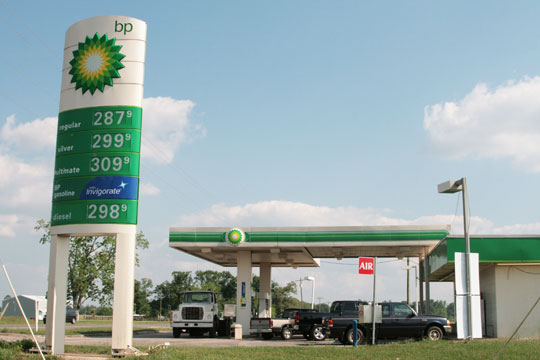Spill Likely Won’t Affect Gas Prices, Reaction Might
May 6, 2010
North Escambia drivers likely won’t feel any pain at the pump in the wake of the biggest oil spill in recent history, but they might get pinched when the clean up ends and the regulating begins.
Energy pricing observers said Wednesday that while any oil spilling into the Gulf is bad for the environment, the amount of oil produced by the BP rig that exploded would not be felt on world markets.
“If you think about it, the amount of crude spewing into the Gulf, while it’s catastrophic from an environmental prospective, it’s a drop in the bucket in terms of what we use, as opposed to say a hurricane,” said Kevin Bakewell, senior vice president of AAA Auto Club South. “Even before the (accident), we were starting to see prices increase, which obviously had nothing to do with the spill. It had more to with an increase in demand and a weakening of the dollar, which has more to do with gas prices than anything other than supply most of the time.”
Bakewell said there was going to be a slight increase in prices at the pump with the summer travel season, generally regarded to run from Memorial Day to Labor Day, about to commence. The AAA Auto Club’s Fuel Gauge Report shows that the average price of a gallon of regular gas in Florida Wednesday was $2.91, up from $2.88 and $2.84 a month ago.
The highest metro area average Wednesday was $2.98 in Gainesville. The lowest average metro price is $2.86 in Tampa and Orlando. Prices in North Escambia were around the $2.87 mark.
“Typically when people feel like there’s an unjust price increase, we hear from them,” Bakewell said. “They don’t hesitate to call and they want know what we’re going to do about it.”
However, Bakewell said how lawmakers in Tallahassee and Washington, D.C. react to the spill could add volatility down the road.
“In the longer term, the (amount) of regulation – are we going to have less drilling or more – could have impact in terms of an increase in cost of doing business,” he said.
Florida State University professor of economics Mark Isaac agreed that the thing to watch when it came to gas prices after the Deepwater Horizon rig explosion was legislation. Already, most Florida officials have backed away from a proposal to allow drilling as close as three miles off the Gulf Coast that had the backing of incoming leaders of the House and Senate.
Likely Republican gubernatorial nominee Bill McCollum has threatened to veto the drilling proposal if it is approved by the Legislature next year under his watch, joining likely Democratic nominee Alex Sink, who has always been opposed to the plan.
“The spill itself isn’t going to have any impact because as I understand it, they were surrounding and getting ready to cap the well, which is standard procedure because they figured out they had a productive find,” Issac said. “Now suppose we went to opposite extreme and said not only will there be no new drilling, but we’re going to shut down existing drilling. The price of oil is set on the world market, but my guess enough of the world’s oil is produced in the Gulf to have a significant impact on price.”
Issac said that the reason there may have only been a slight uptick in prices in the wake of the spill could be that traders of oil futures are betting that the anti-drilling fervor seen in the wake of the spill will eventually subside a bit.
“They’re probably looking forward to something in the middle,” he said. “Oil markets look forward to the totality of availability in future. They had probably factored in the loosienng of the regulatory climate in the U.S. for where we’re going to drill and now they’ll probably say ‘that’s probably not going to happen.’ That could have some impact through the system and there could be some upward pressure on oil (prices), but that’s not enough to have an immediate effect.”
The effect on the politics of drilling is already clear though, Issac added.
“Over the long term, this is not helping the case that people are saying ‘let’s expand drilling in the Gulf and Atlantic,” he said. “That’s pretty obvious.”
by Keith Lang, The News Service of Florida
Comments
One Response to “Spill Likely Won’t Affect Gas Prices, Reaction Might”




They are a bit wishy-washy about what causes the increase in gas prices, aren’t they? LOL
BP could have put a remote auto shut-off valve on that well, the way they are required to do elsewhere in the world, for a half million dollars…and I’ll just bet that half million is looking like pocket change now. But this particular article seems to be introducing the “regulation” boogey man to the topic. Let’s ask the travel industry, seafood industry and recreational boating and fishing workers and business owners what they think about regulating drilling in the Gulf to be at least on par with what is required in the rest of the world. Regulation hasn’t put any other oil companies or drilling operators or off shore workers out of work and I don’t think it’s put any of the fishermen and recreational water sportsmen out of work either.